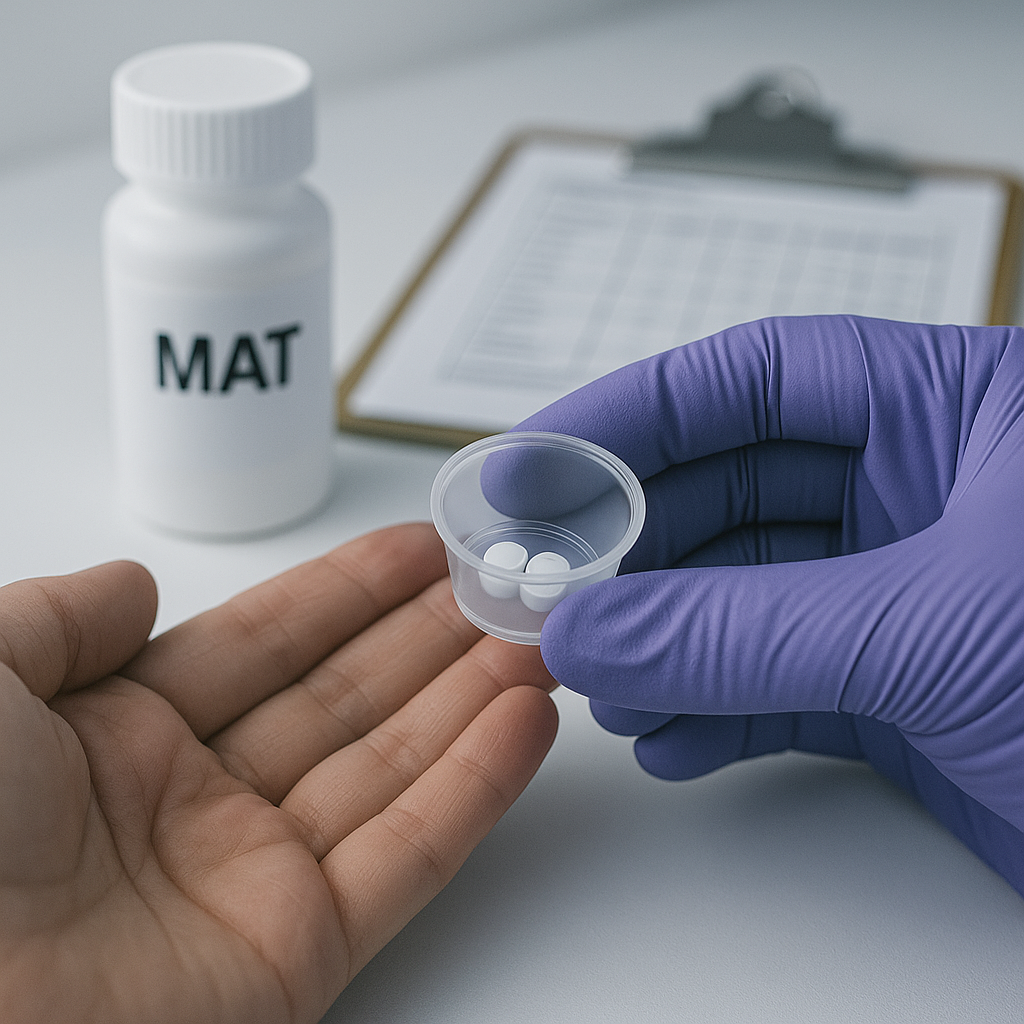Medication-Assisted Treatment (MAT) Services
Comprehensive monitoring and testing services to support addiction medicine and medication-assisted treatment programs with accurate, reliable results.

Supporting Recovery Through Science
Medication-Assisted Treatment (MAT) combines FDA-approved medications with counseling and behavioral therapies to treat substance use disorders. Our comprehensive testing services support MAT programs by providing accurate monitoring of treatment compliance and detecting potential substance use.
MAT has been shown to improve patient survival, increase retention in treatment, decrease illicit opioid use, and reduce the risk of infectious disease transmission. Our testing services help ensure the safety and effectiveness of these life-saving treatments.
We understand the sensitive nature of addiction treatment and provide confidential, accurate testing with rapid turnaround times to support both patients and providers in the recovery process.
Key Benefits of MAT Testing Services
Comprehensive monitoring to support successful addiction treatment
Treatment Compliance
Monitor adherence to prescribed MAT medications including methadone, buprenorphine, and naltrexone.
Safety Monitoring
Detect potentially dangerous drug interactions and ensure patient safety during treatment.
Rapid Results
Fast turnaround times enable timely clinical decisions and treatment adjustments.
Patient Support
Objective testing results support patient accountability and treatment progress tracking.
Regulatory Compliance
Meet federal and state requirements for MAT program monitoring and documentation.
Recovery Support
Evidence-based monitoring supports long-term recovery and reduces relapse risk.
MAT Medications We Monitor
Comprehensive testing for all FDA-approved MAT medications
Methadone
- • Full opioid agonist
- • Long-acting formulation
- • Reduces cravings and withdrawal
- • Requires daily clinic visits
- • Metabolite monitoring available
Buprenorphine
- • Partial opioid agonist
- • Sublingual and injectable forms
- • Lower overdose risk
- • Office-based treatment
- • Norbuprenorphine monitoring
Naltrexone
- • Opioid antagonist
- • Oral and injectable forms
- • Blocks opioid effects
- • No physical dependence
- • Compliance monitoring
Comprehensive Testing Panels
Customized testing panels to meet your program's specific needs
Standard MAT Panel
- • Methadone and EDDP
- • Buprenorphine and Norbuprenorphine
- • Naltrexone
- • Cocaine and metabolites
- • Amphetamines/Methamphetamines
- • Marijuana (THC)
- • Opiates (Morphine, Codeine)
- • Oxycodone and metabolites
- • Fentanyl and analogs
- • Benzodiazepines
- • Alcohol markers (ETG/ETS)
Extended MAT Panel
- • All Standard Panel analytes
- • Tramadol and metabolites
- • Hydrocodone and metabolites
- • Hydromorphone
- • Gabapentin
- • Pregabalin
- • Kratom alkaloids
- • Synthetic cannabinoids
- • Synthetic cathinones
- • Novel psychoactive substances
- • Adulterants and diluents
Sample Types
- • Urine (most common)
- • Oral fluid
- • Hair
- • Blood/Serum
Clinical Applications
MAT testing supports various addiction treatment settings
Opioid Treatment Programs
- • Methadone clinics
- • Compliance monitoring
- • Take-home privileges
- • Diversion prevention
Office-Based Treatment
- • Buprenorphine prescribing
- • Primary care integration
- • Treatment monitoring
- • Safety assessment
Residential Treatment
- • Inpatient programs
- • Detoxification units
- • Therapeutic communities
- • Transition planning
Outpatient Programs
- • Intensive outpatient (IOP)
- • Partial hospitalization
- • Counseling services
- • Recovery support
Criminal Justice
- • Drug courts
- • Probation monitoring
- • Correctional facilities
- • Reentry programs
Healthcare Systems
- • Emergency departments
- • Hospital consultation
- • Pain management
- • Psychiatric services
The Opioid Crisis by Numbers
Drug overdose deaths in the US in 2022
Americans with opioid use disorder
Reduction in overdose risk with MAT
Increase in treatment retention with MAT
MAT Effectiveness:
- Reduces opioid use by 50-80% compared to non-medication treatments
- Decreases overdose mortality by 38-50%
- Reduces HIV and Hepatitis C transmission
- Improves social functioning and quality of life
- Reduces criminal activity and incarceration rates
Support Recovery with Reliable Testing
Partner with us to provide comprehensive MAT monitoring services that support patient recovery and program success.